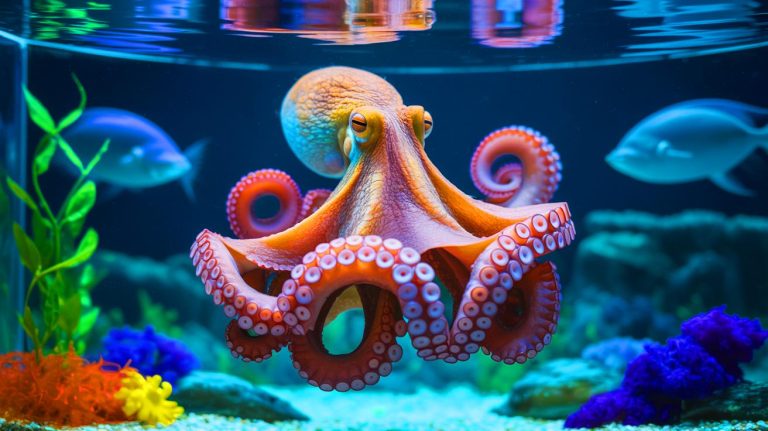| IN A NUTSHELL |
|
Amidst a world increasingly conscious of ethical considerations in food production, the proposal for the first commercial octopus farm by Nueva Pescanova has ignited a complex debate. As efforts to conserve wild octopus populations transition toward aquaculture, the ethical and environmental dimensions of farming such sentient creatures have come under intense scrutiny. This controversy touches on the intelligence of octopuses, the welfare implications of their farming, and broader environmental concerns. Here, we explore the multifaceted discussions surrounding this issue, examining the scientific, ethical, and legislative responses that have emerged globally.
The Cognitive Abilities of Octopuses
Octopuses are renowned for their remarkable intelligence, often drawing comparisons to terrestrial mammals. With around 500 million neurons, their cognitive abilities are comparable to those of dogs. This intelligence is distributed throughout their bodies, with two-thirds of neurons located in their arms, allowing for autonomous arm movement and decision-making. Such a sophisticated neural architecture enables octopuses to perform complex tasks like solving puzzles, using tools, and even learning from other octopuses.
Documented cases highlight their problem-solving skills. A notable example involves an octopus named Otto, who managed to short-circuit an aquarium’s power by squirting water at a light, reflecting problem-solving and possibly a sense of mischief. Additionally, octopuses have been observed constructing dens and opening jars from the inside, further demonstrating their dexterity and cognitive depth. These abilities have fueled the debate over the moral implications of farming such intelligent creatures.
Ethical Implications of Octopus Farming
The ethical concerns related to octopus farming are grounded in the animal’s sentient nature. A review by the London School of Economics concluded that octopuses can experience both pleasure and pain, prompting the UK to recognize them under the Animal Welfare (Sentience) Act. This recognition is unique among invertebrates and highlights the need for humane treatment.
Nueva Pescanova’s farming proposal has raised alarms regarding the welfare of octopuses. The proposed high-density tank conditions conflict with their solitary nature, potentially leading to stress and aggression. Moreover, the use of ice slurry as a killing method has been condemned for causing prolonged suffering. Experts, including neuroscientists, argue that such practices are unacceptable for creatures of advanced cognition, calling for more humane alternatives.
Legislative Responses and Global Reactions
The proposal for commercial octopus farming has sparked swift legislative responses. In the United States, Washington state has banned octopus farming, citing ethical and environmental concerns. Federal legislation, known as the OCTOPUS Act, has been introduced to prohibit such farming nationwide and restrict imports of farmed octopus. These legislative actions reflect a growing recognition of octopuses as intelligent beings undeserving of commercial exploitation.
On an international level, the backlash is gaining traction. The European Union faces mounting pressure to address the ethical implications of octopus farming, with protests occurring in Spain and beyond. Public sentiment is increasingly opposed to what is perceived as a new frontier of animal cruelty. As awareness of octopus intelligence and the potential for suffering spreads, calls for responsible and ethical treatment are resonating globally.
Environmental and Scientific Considerations
While proponents of octopus farming argue it could relieve pressure on wild populations, critics point to significant environmental concerns. Octopuses are carnivorous, requiring substantial fish resources for feed, which could strain already depleted fish stocks. This practice runs counter to conservation efforts aimed at sustainable resource management.
Furthermore, the scientific community is grappling with the moral implications of farming such intelligent creatures. Documentaries like “My Octopus Teacher” have brought to light the emotional depth and complex social behaviors of octopuses, challenging traditional views. As research continues to uncover the genetic markers of intelligence shared between humans and octopuses, questions about the ethical use of this knowledge emerge. Should it be leveraged for industrial purposes, or should it foster a deeper appreciation and protection of these remarkable animals?
The debate over the world’s first commercial octopus farm highlights a critical moment in our relationship with intelligent marine life. Scientific insights into octopus cognition underscore the profound ethical and environmental questions surrounding their farming. As legislative actions and public protests intensify, the future of octopus farming remains uncertain. Will society prioritize ethical considerations and conservation, or will economic interests dominate the discourse? The answer may shape how we engage with the natural world for generations to come.
Did you like it? 4.6/5 (26)







Wow, octopuses have 500 million neurons? They’re like the Einsteins of the sea! 🧠🐙
Isn’t it ironic that we’re trying to conserve them by farming them? 🤔
Thank you for shedding light on this important issue. More people need to be aware! 🙏
Can we really justify octopus farming given their intelligence and sentience?
This is horrifying. Why would anyone think it’s okay to treat such intelligent creatures this way?
Great article! But are there any humane alternatives being proposed?